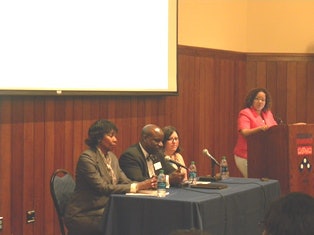
Dr. Marybeth Gasman, head of the Penn Center for Minority Serving Institutions and professor of higher education in the Graduate School of Education, refutes the notion that HBCUs are not an integral part of American higher education.
“Perfect students on paper do not always translate to perfect students,” Gasman said at The Library Company of Philadelphia’s annual Juneteenth Freedom program. “We have to stop comparing HBCUs to Ivy League institutions unfairly.”
The seminar theme, “Freedom and its Aftermath: Black Education from Emancipation to the Present,” commemorated one of the oldest known celebrations for the end of slavery in the United States by highlighting the overarching HBCU significance since 1865, and the fight for equal education post Brown v. Board of Education.
Gasman noted that HBCU graduates greatly contribute to the middle-class economy in spite of the overall low African-American student enrollment in higher education and the opposition to the mission of Black colleges.
“If it were not for Black colleges, we would not have the Black middle class we have right now,” she said. “HBCUs graduate students at a disproportionate rate, even though they enroll 11 percent of all African-American students, yet graduate 22 percent. Although many have tried to force Black colleges to steer away from their mission of racial uplift, they continue to have impact.”
HBCUs also prepare Black students for STEM disciplines and doctoral programs in greater numbers than majority White institutions.




















